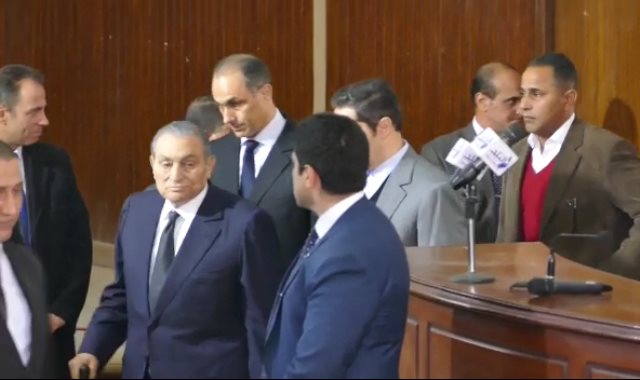I have a soft spot for contrarians. There is something endearing about people who take a perverse pleasure in going against the grain: they are necessary, not least because they challenge the rest of us to revisit ideas we hold as gospel truths and re-examine our own prejudices. Even when they do not change our minds, they help refine our beliefs and strengthen our arguments for them. They are quite different from revisionists, whose challenging of facts tends to be driven by ideology rather then love of a good argument, or apologists, whose motivations tend to be financial or careerist. But contrarians can also fall into the trap of over-doing it, of adopting an untenable position for the sake of sheer provocation.
Tarek Masoud, a young professor at Harvard and the author of a forthcoming book on Egyptian elections and the Muslim Brotherhood, may have been in such a convoluted contrarian mode last week. Speaking at a conference on Egypt’s political future at George Washington University, Masoud postulated that the election of Gamal Mubarak as president would be a step forward for Egyptian democracy. Far from being an impending disaster of historic proportions, as many in the opposition argue, hereditary succession of power within the Mubarak family may be the least bad of available choices, he said. Masoud is not an apologist: he recognized that “the prospect of Gamal Mubarak's inheriting his father's seat is of course repellent.” But he tried to make the case that it also had its upsides.
Masoud’s argument, which he elaborated in a recent article for Foreign Policy, is as follows. First, Gamal is the least unattractive choice in a limited set of options that includes “a seventh Mubarak term, a handover to some stony-faced apparatchik-like intelligence chief Omar Suleiman, or a military coup.” Second, Gamal would be the first civilian president of Egypt, entrenching the principle of civilian, rather than military, rule. Third, a president coming from the military (like Suleiman) would likely further prolong the Emergency Law and the strengthen the security state. Fourth, winning in a “competitive” (the distancing quotation marks are his) election would enshrine the principle of electoral democracy in a country where leaders have been traditionally appointed by a shadowy conclave of generals. And lastly, precisely because a Gamal Mubarak presidency is likely to be fragile and unpopular, it would provide a greater opportunity for opposition breakthroughs.
It’s a provocative thesis, at least among those Egyptians who oppose the inheritance of power, and the last point especially may be worth considering. But the rest is easily dismissible. For starters, although it’s difficult to tell what Egyptians as a whole think–in the absence of reliable public opinion polling, limited freedom of political organization and limited freedom of speech, notably on terrestrial radio and television–it seems pretty clear that there is little enthusiasm for either hereditary succession or Gamal Mubarak personally. Indeed, one of the mysteries of Gamal Mubarak’s center-stage presence in national politics over the last decade is how little public appeal he has been able to garner. It is not clear at all that Egyptians would prefer hereditary succession over a military strongman.
Rather than breaking with military rule, as Masoud argues, the election of Gamal Mubarak would both reinforce the already pervasive perception of elections as theatrics and emphasize the principle of hereditary, rather than civilian, rule. Indeed, it would reinforce the existing type of civilian rule–the day-to-day rule by the civilian security services that has dominated Egyptian life for at least two decades–in defense of hereditary transfer of power. This is what many have argued is taking place in Egypt, as well as places like Algeria, Libya, Tunisia, Yemen, and other Arab republics where aging leaders are maneuvering to leave power to their relatives. Such regimes have no need for emergency laws since the extraordinary prerogatives used by their security services have been either been sanctioned by ordinary law or are simply taken extra-legally.
Masoud’s emphasis on elections–and the scenario whereby Gamal Mubarak “legitimately” wins (in a race supervised by a presidentially-appointed electoral commission and a Ministry of Interior that isn’t exactly politically neutral)–is also deeply misleading. Egypt has had an electoral system for nearly a century, the concept is not exactly new or foreign. It has parliamentary elections that, in their own and albeit hardly ideal way, can be extremely competitive. What is doesn’t have, as voter turnout figures of around 20-25 percent suggest, is credible elections.
Perhaps the question is not whether Gamal Mubarak, or any other potential president, would superficially respect constitutional and electoral practice. It is whether that candidate can advance a new vision of Egyptian society whereby the relationship between the state, its agents of authority and citizens is redefined. This question may be much more important to the average Egyptian than how elections are run or even who becomes the next president. We have a fairly clear idea of Gamal Mubarak’s economic project, which had its admirers and detractors, and is often used to make a case for him abroad. But it remains a mystery what Gamal Mubarak’s political project is, aside from himself.
Issandr El Amrani is a writer on Middle Eastern affairs. He blogs at www.arabist.net. His column appears every Tuesday.



